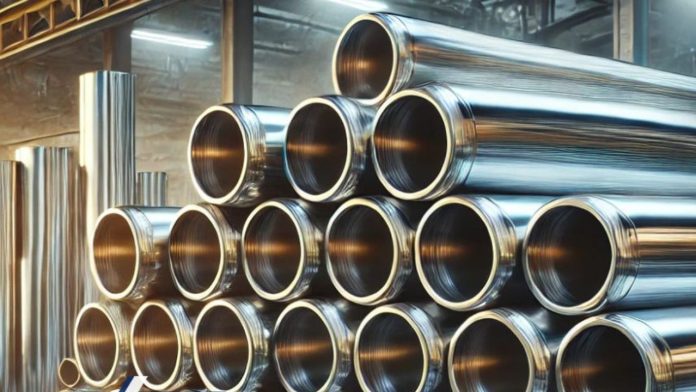Electric Resistance Welded (ERW) pipes serve as fundamental elements throughout multiple industries but find their greatest use in the oil and gas sector. The oil and gas industry depends increasingly on ERW pipes because of their superior weld quality cost-effective solutions and flexible design capabilities. This article examines how ERW pipes serve essential functions throughout the oil and gas sector.
Transportation of Oil and Gas
Transportation of crude oil and natural gas along with refined products represents the main purpose that ERW pipes serve in the oil and gas industry. The internal uniformity of ERW pipes combined with their structural consistency creates an environment for effective and secure fluid transport throughout extended lengths. ERW pipes serve as pipeline-building materials because they provide the exceptional strength needed to operate under demanding pressure and temperature requirements. ERW pipes demonstrate excellent corrosion resistance and environmental durability which enables their use in pipelines that travel across desert areas forests and underwater locations. The cost-efficiency character of these pipes enables oil and gas firms to construct elaborate pipeline systems that remain within budgetary parameters.
Drilling Operations
ERW pipes function as essential drilling components because they serve as casing pipes. Drilled wells receive structural support from casing pipes which line their walls to prevent well collapse during extraction. ERW pipes demonstrate exceptional suitability for drilling applications because their precise construction and durable nature allow them to withstand high drilling pressures and stresses. In addition to serving as risers, the pipes function to connect undersea well openings to surface facilities. The combination of a smooth surface finish and strong construction in ERW pipes minimizes equipment wear and extends drilling equipment service life.
Structural Applications
ERW pipes serve structural applications extensively throughout the oil and gas industry. Their combination builds the essential framework for facilities such as rig platforms and storage installations. Their light weight together with strong tensile properties enable firms to design strong building frameworks that maintain performance underweight strains and tough climate conditions. Offshore platform fabrication requires ERW pipes because they deliver essential strength alongside corrosion protection. The weld quality and uniform distribution of these pipes maintain their operational reliability and safety performance in harsh offshore environments.
Gathering and Distribution Lines
ERW pipes serve as a primary material choice for building gathering and distribution lines in addition to their use in long-distance pipeline systems. Processing facilities receive their crude oil and natural gas supply through gathering lines which collect products from multiple wells and distribution lines transport processed products to end users. The fabrication and installation convenience of ERW pipes makes them the preferred choice for these applications. The combination of pressure tolerance and performance reliability across multiple environments makes ERW pipes an ideal solution for gathering and distribution networks.
Refinery Applications
Refineries employ ERW pipes to fulfill diverse operational requirements because they transport raw materials and deliver products starting from gasoline to diesel and petrochemicals. The pipes serve multiple applications within refinery equipment that function under high temperature and pressure conditions. ERW pipes deliver dependable performance in refining operations because of their exact dimensions and superior strength which remains essential for processes requiring both efficiency and safety. The economical production method of ERW pipes leads to lower operational costs within refinery operations.
Water Injection Systems
Water injection represents an established method in enhanced oil recovery which helps preserve reservoir pressure while boosting oil extraction rates. Water injection systems built with ERW pipes deliver reliable water transportation to reservoirs because of their extensive use in construction. Oil and gas production pipelines with ERW pipe material demonstrate both corrosion resistance and long-duration properties appropriate for dependable water flow operations with their common presence of chemicals in water streams. The characteristics of these systems reduce maintenance needs while extending the operational lifetime of water injection systems.
Gas Compression Stations
Stations dedicated to gas compression perform a critical function by keeping natural gas flowing properly through pipeline networks. ERW pipes serve as the standard material for connecting compressors separators and other equipment within these stations. ERW pipes demonstrate exceptional performance under high pressure conditions while maintaining resistance to both internal and external stress which makes them ideal for gas compression applications. The pipes have a smooth internal structure which allows energy-efficient gas transport while reducing turbulent drag.
Conclusion
ERW pipes have become the fundamental infrastructure for the oil and gas industry because they deliver durable performance with efficient operation at cost-effective prices. The oil and gas industry depends on ERW pipes because of their versatility and reliability across transportation drilling and structural and refinery applications. ERW pipes will continue to play a vital role in maintaining safe and efficient operations because the industry demands keep increasing. The oil and gas industry depends on ERW pipes because they demonstrate exceptional adaptability to different operational challenges which maintains their position as the global industry standard.










